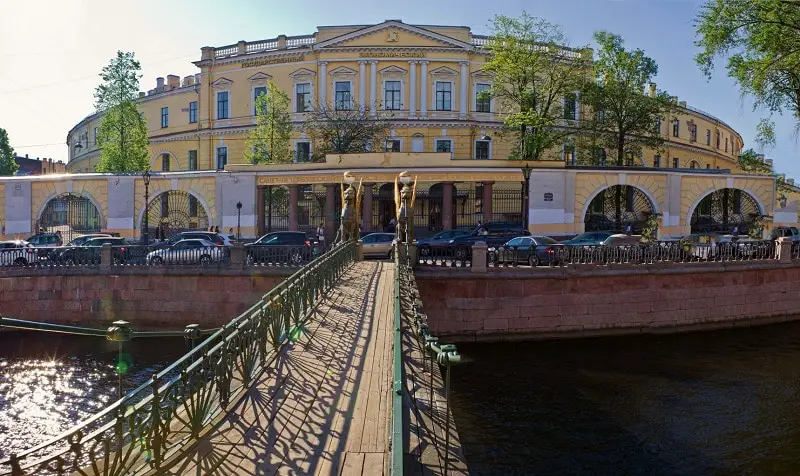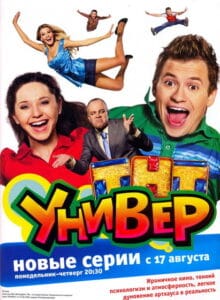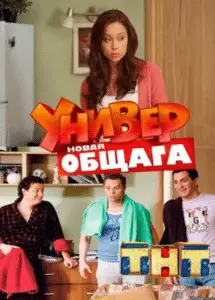Deciding on a university major in Russia tends to be a serious and permanent decision. In part because most faculties in Russia have their own entrance exams, changing a major involves not just “declaring” a new major, like in the US, but often involves essentially a whole new application to the university. Further, degree programs are highly structured and regulated, meaning that it is harder to transfer credits from one program to another, which is another reason why changing majors in Russia often means simply starting college over again.
Olga Dmitraschenko entered Moscow State University in 2006, as an international relations major, after completing her high school experience via home schooling. She wrote of her experience taking MSU’s entrance exams in two previous installments. Below, she discusses the benefits and downsides of the rigid structure of the degree program. This is all part of a series of free Russian lessons sponsored by SRAS called Olga’s Blog. The blog documents – in simplified, modern Russian – Olga’s experience finishing high school, starting college, and living life in Moscow in 2006-2007. The text, links, and format of this resource were last updated in 2023.
Briefly About University Major Programs in Russia
The vast majority of undergraduate programs at MSU take four years to complete. Most courses are prescribed with a limited number of electives available. Physical education and exercise are mandatory parts of most programs. Incoming classes of students also tend to stay together throughout the full program, taking all classes together and participating in extracurricular activities together. This means that graduates in Russia are standardized, having taken almost all the same classes and having had the same educational experiences together.
Cohesive graduating classes are perhaps the most unique feature of Russian degree programs. Graduates are likely to know their classmates extremely well as they enter the workplace. They are likely to use their connections to help each other advance in their professions. This has downsides, creating what might seem like closed systems or “clans” with potentially a limited range of perspectives and ideas. There are also upsides, creating efficiency in knowing the skill sets and interests of many other young professionals in the field in order to recommend each other for various new positions they hear about.
University Majors in Russia: Simplified Russian Text from Olga’s Blog
This is Lesson 6 of Olga’s Blog, a series of intermediate Russian lessons.
Note that:
- All of the bold words and phrases have annotation below.
- Red words and phrases indicate the subject of this blog entry’s grammar lesson.
- *Asterisks indicate slang.
Привет всем!
Сегодня я начну рассказывать вам про свои первые дни в МГУ. Американцам это может показаться необычным, ведь университеты в Америке и России разные и системы образования отличаются. Например, в Америке студенты могут сами выбирать из предметов, входящих в курс обучения. И поэтому, когда американские студенты приходят подфак* на такие программы, им тоже дается выбор. Но в России же студенты почти всех вузов обязаны проходить определенные нормативные занятия. Вот такой беспредел* получается.
В универе* нам раздали расписание. У всех предметы были одинаковые. Вот, что у нас на первый семестр – информатика, английский язык, философия, история России, экономика, высшая математика, культурология, БЖД, введение в специальность.
Но зато на физкультуре можно было выбирать! Первое собрание по физкультуре проходило на открытом стадионе во время дождя. Тренер собрал у студентов медицинские справки (это отдельная история, расскажу ее позже) и раздал бланки, в которых нужно было отметить, в какой из 5 спортивных секций хочешь заниматься. Нам предложили степ, фитнес, легкая атлетика, футбол, плавание. Ни секунды не задумываясь я поставила галочку рядом с плаванием! Это офигительный* и интереснейший вид спорта. Но после нескольких занятий, тренер сказал, что готовит ребят к соревнованиям и у себя в группе оставил только мальчиков. Вот такая дискриминация, так что пришлось мне перейти на легкую атлетику. Но я совсем не жалею. Мы там бегаем, прыгаем в песок, делаем всякие упражнения. Все это очень весело и полезно.
Так, идем дальше о прогамме! Я думаю, может быть это даже хорошо, что все мы занимаемся по одной программе, это сближает и к пятому курсу, когда мы все получим степень специалиста, мы будем хорошо знать друг друга. И вообще, в МГУ очень много возможностей познакомиться с интересными новыми людьми. Второкурсники каждые два месяца организовывают для нас поездки. В прошлый раз мы ездили в Пансионат «Елочка» в Подмосковье. Но это уже не учеба, это отдых! Отдых будет потом – а пока у меня занятия и мне надо бежать! Наверное, у вас тоже есть учеба – бегите!
Пока!
Vocabulary and Cultural Annotations
Подфак: slang term created from an abbreviation of “подготовительный факультет,” or “preparatory faculty.” Подфак gives a student status within the university, but not as a degree-seeking student. It is often a status of a student preparing to enter a degree program, but needing additional language or subject training. This is also the technical status at many universities for students who arrive for short term study abroad courses within a university.
Беспредел: slang term referring to “non-observance of rules” (несоблюдение правил). Olga is making a light joke based on the irony of the situation that foreigners are often given more choice than Russians in Russian educational institutions. More on this subject in point three below.
Универ: slang term for “university” (университет). Shortened terms in Russian such as this one most often indicate an affinity for the object of the original term.
Предметы были одинаковые: the subjects were identical. Russian degree programs are most often highly regimented. Students are assigned to a group and take all their prescribed classes together for the duration of their program (it’s similar to the way many junior high schools function in America). As Olga will describe later, this has its benefits and drawbacks. While choice is nice and can foster creativity, studying with the same group means you know many of your future colleagues very well at the end of your program. The personal contacts this represents can be even more valuable than the education itself (a fact that holds true in Russia as well as America).
Информатика: Information Technology. Essentially, this class covers how to use computers, libraries, the Internet, and other research techniques. Notice the word is a composite noun – formed from combining the words “информация” and “техника.”
Культурология: Cultural Studies. This is a relatively new field that combines a wide range of concepts from fields such as sociology, anthropology, rhetoric, philosophy, and political economy to study the culture of a group as a whole.
БЖД: Life Safety (Безопасность Жизнедеятельности) a subject that studies natural disasters, accidents, terrorism, self-defense, and how to react to extreme situations.
Введение в специальность: “Introduction to the Specialty.” Essentially, this is Foreign Policy 101. Note, however, that none of Olga’s classes list indexical numbers. Because the programs are assigned, there is little need for Russian universities to give such indexes.
Степ: Step Aerobics.
Фитнес: “Fitness” in Russian combines essentially anything that might be found at a large fitness club (aerobics, body building, cross training, and most forms of sport).
Легкая атлетика: “Light Fitness” includes most track and field events. It is worth mentioning, however, that sport has always been taken very seriously in Russia. Russians discern between more types of sport and physical activity then Americans do. The differences between these can often be extraordinarily subtle. Those who are especially interested in the subject are encouraged to research it further. Contact SRAS on ideas where to start.
Офигительный: slang term meaning, essentially, “there’s nothing like it.” It’s often used in place of more standard Russian words and phrases such as “необыкновенный,” “поражающий,” and “приятно удивляющий.”
Готовит к соревнованиям: to prepare for a competition. While Olga could have easily filed a complaint for her class being suddenly segregated based on sex, in Russia such occurrences are generally simply accepted as the decision of those in charge.
Прыгаем в песок: the long jump.
Степень специалиста: “specialist’s degree.” This is the recognized equivalent of an MA in the US. Russian degrees differ slightly, however, and actually include a level beyond Ph.D. called “Доктор наук.”
Поездка: excursion. As mentioned before, bonding within the group is seen as an important part of the students’ educational experience. Thus, the university encourages this with frequent excursions. Students are expected to pay their own way for these, but they are most often quite inexpensive.
Пансионат «Елочка»: The Fir Tree Resort. The Soviet Union had a serious of “Houses of Rest” (Дома отдыха) built for various social groups to take short vacations just outside of the city limits. These feature health, medical, and recreation facilities. Most are privatized now, but still very inexpensive and enjoyable.
Grammar Focus: The Use of the Imperative
The imperative mood is used to demand or require that an action be preformed. Obviously, the imperative can be seen as being quite powerful and using it with people with whom one feels one should be polite or with whom one does not have an established social relationship provides an excellent example of where grammar becomes mixed with cultural expectations. This is also a point with which students often have difficulty.
Russian, like English, has developed several ways of “softening” such demands to allot for such expectations.
In English, the imperative mood is most often formed by using the base form of the verb without stating the subject (eg. “Go to the store” or “Buy some milk”).
Russian forms the imperative most by adding “ите” or “йте” to the verb root if giving a command to multiple subjects or to subject the speaker does not know on an informal basis. (Ходите в магазин; Дайте мне газету). If the subject is singular and known well, the final “те” is dropped from the above form (Ходи в магазин; Дай мне газету). The subject in Russian is also left unstated in the imperative. – Note: formation of the imperative is slightly more complex than this implies and will be covered in the next edition of Olga’s Blog.
The first variant is perfectly acceptable in most social situations such as in restaurants and shops. Russians frequently add the word “пожалуйста” (please) to the end of the imperative or the words “Будьте добры” (the equivalent of the English “Would you be so kind as to”) to the beginning of the imperative to soften the command.
Russians also replace imperfective verbs with perfective verbs in order to soften requests. For example “Иди сюда!” (Come here!) can be often heard from Russians walking dogs and small children on city streets. “Пойдите сюда” (come here) can be heard in professional settings between colleagues. “Пойди сюда” is sometimes used between friends and lovers. In all cases, the grammar is correct and the meaning essentially the same, but the tone of the command is changed.
When to use these formations, beyond using the basic rules concerning number and familiarity of the audience, is largely a matter of stylistics.
However, students should also always remember that negative commands must always use the imperfective. Не ходите на этот фильм, он неинтересный. (Don’t go to that film, it’s not interesting.)
Examples From Literature and the Press
А вот моя дочка, ну пойди сюда. В. Набоков
Спасайте жизнь, бегите прочь отсюда! В. Шекспир
Успокойте же меня, приезжайте и скажите, что всё хорошо. А. Чехов
More Free Russian Lessons From Olga’s Blog

The Circus in Russia: Olga’s Blog
Olga here turns her attention to the modern Russian circus, describing what it is like to attend a contemporary performance, from the atmosphere inside the circus building to the acts that still draw enthusiastic audiences today. Written in simplified, modern Russian, her account offers a firsthand glimpse into how a traditional cultural institution continues to […]

The Language and History of Caviar: Olga’s Blog
Olga below describes the place of caviar in Russian food culture. In simplified Russian, she describes where the delicacy is harvested from, the major types of caviar, and how the types differ in cost and quality. We also provide an English primer below discussing more of the history of caviar, how it is eaten and […]

Mushrooms in Cultures and Cuisines: Olga’s Blog
Olga below continues her discussion of the deeply held place that mushrooms have in Russian culture. In part one of this discussion, she focused on how and where and find the mushrooms. In part two, below, she discusses how the mushrooms are preserved, prepared, and consumed. A staple of the regional diet for centuries, mushrooms […]

Mushroom Season Has Begun! Olga’s Blog
Olga below discusses the deeply held national tradition of mushroom gathering. An important part of Russian food tradition for many centuries, Russian children are taught in school from an early age to tell the difference between various types of native mushrooms. Many, like Olga, will go with relatives and friends to the woods to put […]

Study Abroad in America for Russians: Olga’s Blog
As part of her major program in international relations at Moscow State University, Olga applied to study abroad in the United States in 2007. As was not uncommon for students applying for study abroad in either direction, Olga hit several bureaucratic snags. What is perhaps most remarkable about the below text, however, is the description […]








